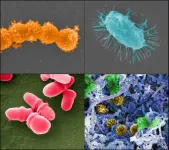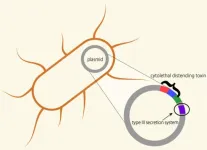(Press-News.org) British techbio innovator Etcembly is teaming up with researchers and clinicians from the University of Surrey to launch a groundbreaking new study that could transform the future of cancer treatment. By analysing the immune cells of cancer survivors, this research is set to reveal untapped targets that could deliver the next generation of immunotherapies.
In recent years, treatments that harness a patient’s own immune system to fight cancer have become a key pillar of oncology. However, these drugs don’t work for all, and a wider range of novel immunotherapies is urgently needed.
T cells – specialised immune cells that recognise and destroy cancer – are a vital part of the immune response against the disease. However, the specific molecules that these cells target within tumours remain unclear.
This collaboration between Etcembly and Dr Nicola Annels at the University of Surrey, together with Professor Hardev Pandha at the Royal Surrey Hospital, will take a fresh approach to finding these targets by analysing samples from patients who have survived various cancers for more than three years.
By uncovering the molecules that T cells use to recognise and destroy cancer cells, the team hopes to unlock novel targets for breakthrough treatments, including Etcembly’s own pipeline of immunotherapies.
At the heart of the study are T cell receptors (TCRs) and antibodies, which immune cells use to find and destroy tumours. Etcembly will use their proprietary single-cell sequencing technology and AI-driven analytical platform, EMLyTM, to analyse millions of TCRs and antibodies in blood and tumour samples taken from patients with complete or near-complete responses to immunotherapy.
By harnessing the unparalleled capabilities of large language models (LLMs) – a form of generative AI – and advanced structural modelling, the team aims to identify tumour-reactive receptors and trace them back to the molecules that they are detecting within cancer cells. The team expects to pinpoint and prioritise these targets within 12 to 18 months, accelerating the development of life-saving treatments for patients worldwide.
Nick Pumphrey, Chief Scientific Officer at Etcembly, said, “We’re delighted to collaborate with the team at the University of Surrey on this pioneering research project. By studying people who are surviving cancer, we can identify TCRs and targets that have already proven to be effective, giving us a blueprint to develop a new generation of life-saving immunotherapies.”
Hardev Pandha, Professor of Medical Oncology at the University of Surrey and Royal Surrey NHS Foundation Trust, added, “Immunotherapy has been transformational in the field of oncology this last decade. Studying the immune system, and in particular the tumour immune microenvironment, in these responder patients using Etcembly’s approach will be strongly supported by patients to accelerate the development of potent immunotherapies applicable to a wide range of cancers.”
Find out more at https://www.etcembly.com/long-term-survivor-study
Contact:
Kat Arney
etcembly@firstcreatethemedia.com
END
Etcembly and University of Surrey launch pioneering study to unlock next-generation cancer treatments from survivors
2024-10-17
ELSE PRESS RELEASES FROM THIS DATE:
City microbes surviving on disinfectants, research reveals
2024-10-17
After the recent pandemic, our use of disinfectants has increased, but are our efforts to create sterile urban environments backfiring?
A new study published in the journal Microbiome has identified novel strains of microbes that have adapted to use the limited resources available in cities and shown that our everyday behaviour is changing the makeup of microorganisms in indoor environments.
“Built environments offer distinct conditions that set them apart from natural and engineered habitats,” says Dr Xinzhao Tong, an assistant professor at Xi’an Jiaotong-Liverpool University (XJTLU), China, and lead author ...
Sleeping for 2: CBT for insomnia combats postpartum depression
2024-10-17
Cognitive behavioural therapy for insomnia (CBTI) delivered during pregnancy significantly reduces postpartum depressive symptoms in mothers, new research from UBC shows.
Researchers from the Vancouver and Okanagan campuses investigated whether treating insomnia during pregnancy could alleviate symptoms of postpartum depression, which affects many new mothers.
“Early intervention is crucial for infant and maternal mental health,” says Dr. Elizabeth Keys, an Assistant Professor in UBCO’s School of Nursing and study co-author. “Our research explores how addressing sleep problems, like insomnia, can lead to ...
Financial incentive encourages healthiness: why isn't it used more often?
2024-10-17
Move more, quit smoking, lose weight: great resolutions, hard to keep. But does it get easier if there is a financial incentive in return? According to research by Radboud University and others, it can be an effective tool, although there are still some obstacles. They presented their findings this week in Economisch Statistische Berichten (ESB).
Some lifestyle interventions are more effective than others, but in general, financial incentives are a ‘powerful tool to help reduce health inequalities in the Netherlands’, says Koen van der Swaluw of Radboud University. Despite knowing more and more about the effectiveness of financial incentives to promote ...
People sympathize with bullied AI bots
2024-10-17
In an Imperial College London study, humans displayed sympathy towards and protected AI bots who were excluded from playtime.
The researchers say the study, which used a virtual ball game, highlights humans' tendency to treat AI agents as social beings – an inclination that should be considered when designing AI bots.
The study is published in Human Behavior and Emerging Technologies.
Lead author Jianan Zhou, from Imperial’s Dyson School of Design Engineering, said: “This is a unique insight into how humans interact ...
Providencia rustigianii has virulence gene akin to Salmonella’s
2024-10-17
Salmonella and E. coli are well-known bacteria that cause food poisoning, but less understood are species of Providencia, another causative agent of serious symptoms. Providencia rustigianii, isolated from pediatric gastroenteritis patients, has now undergone whole genome sequencing by a research team led by Osaka Metropolitan University Professor Shinji Yamasaki of the Graduate School of Veterinary Science and the Osaka International Research Center for Infectious Diseases.
Members of the team had previously reported that P. rustigianii carries a cytolethal distending toxin virulence gene on its plasmid. Elimination of this gene did not ...
Ozempic (and similar medications) may be the new treatment for opioid and alcohol use disorder
2024-10-17
A new study published in the scientific journal Addiction has found that people with opioid or alcohol use disorder (OUD, AUD) who take Ozempic or similar medications to treat diabetic/weight-related conditions appear to have a 40% lower rate of opioid overdose and a 50% lower rate of alcohol intoxication than people with OUD and AUD who do not take Ozempic or similar medications.
Ozempic is one of several medications, called glucagon-like peptide-1 receptor agonists or GLP-1 RAs, that are prescribed to treat diabetes, obesity, and other weight-related medical conditions. The medications interact with ...
Artificial nests boost penguin breeding success, but there’s no one-size-fits-all design
2024-10-17
Artificial nests can boost the breeding success of endangered African penguins, but different designs are more effective at different colonies according to a new study by an international team of researchers from South Africa and the UK. The findings are published in the British Ecological Society journal, Ecological Solutions and Evidence.
A new study, led by researchers at Nelson Mandela University, which monitored the breeding success of African penguins for 12 years across South Africa has found that artificial ...
Study: Pediatric healthcare facilities need more staff dedicated to infection prevention
2024-10-17
Arlington, Va. — October 17, 2024 — A new paper published today in the American Journal of Infection Control (AJIC) describes efforts at a major children’s hospital to assess and fulfill its staffing needs for infection prevention and control, highlighting the challenges of allocating sufficient resources to this important role. Infection preventionists (IPs) at Boston Children’s Hospital found that conventional methods for calculating the number of staff for these roles do not accurately reflect the current needs of healthcare systems or the specific needs of a pediatric ...
Marine experts challenge reliability of vessel strike prediction models
2024-10-17
A new study has raised questions about current approaches to predicting the risk of vessel strikes on whales.
Led by researchers at Heriot-Watt University in Edinburgh, Scotland, an international team of scientists compared eight models currently in place to assess and forecast the risk of ships colliding with whales. The study reveals notable inconsistencies in the results across the different models.
Most reports of vessel collisions involve large whales but all species can be affected. Globally, strikes are under-reported and can often go undetected, particularly when they involve large vessels. Collisions can result in animals being injured or killed, and vessels ...
USC study finds link between PFAS, kidney function and gut health
2024-10-17
New research has revealed that the connection between per- and polyfluoroalkyl substances, or PFAS, and kidney damage may be tied to dysregulation of the gut microbiome, which is made up of bacteria and other microorganisms that live in the digestive tract.
PFAS are manufactured chemicals used in a wide range of products, including everything from furniture to food packaging. They are often called “forever chemicals” because once they accumulate in the environment or the human body, they take a very long ...




